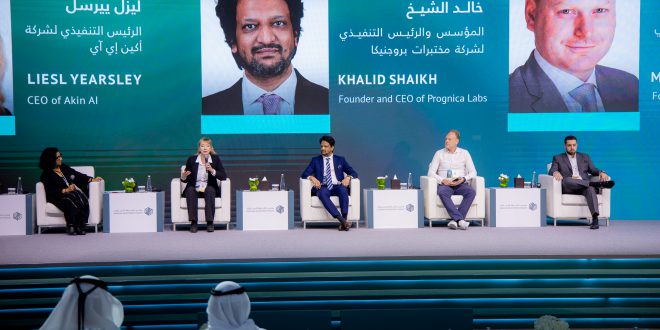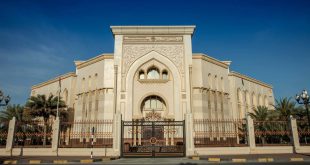A panel of experts and experts at the Sharjah Investment Forum (SIF 2024) affirmed that innovation and technology are key factors in building a better tomorrow and a brighter future, noting that advancements in artificial intelligence (AI), healthcare, and energy sectors will dramatically transform industries, societies, and economies.
- Titled ‘Innovation for Tomorrow: Strategies and Technologies Shaping the Future,’ the session hosted Kareem Ayyad, Founder and CEO of Uktob AI; Dr. Morgan Eldred, Founder of Digital Energy; Khalid Shaikh, Founder and CEO of Prognica Labs; and Liesl Yearsley, Founder and CEO of Akin. The session was moderated by Selma Turki, Partner for Digital and Emerging Technology in MENA at Ernst & Young.
AI for life: Entering a new era of personal assistance
“AI has evolved through three waves starting in the 50s,” Liesl Yearsley, Founder and CEO of Akin AI, explained. “We are now on the brink of wave three — adaptive reasoning — which is about self-learning AI that works with minimal data and operates in chaotic environments. This wave will be absolutely transformative.”
Her company designs and builds advanced AI models aimed at fostering a future where AI and humanity coexist symbiotically.
Yearsley highlighted how AI already generates 30% of the content we encounter today and predicted that adaptive reasoning AI will revolutionise key sectors, comparing the scale of this transformation to the Industrial Revolution, where 90% of the workforce shifted from manual labour to mental labour. Soon, AI will handle the ‘invisible work’ of life, freeing us to focus on higher-level work. Think about it — people spend hours a day engaging with AI systems without even realising it. When you use your phone, it’s looking back at you. Whether you’re checking your battery, scrolling through messages, or playing games, AI is observing the micro-expressions on your face, where your eyes focus, and your emotional responses. Just to sell someone a credit card, we used to track 1,200 variables. If we introduce an AI assistant into your life, we could track even more, doubling the conversion rate in any given session.”
AI in healthcare and energy innovation
Khalid Shaikh, Founder and CEO of Prognica Labs, the AI-based company working on early detection and diagnosis of breast cancer, turned the discussion toward healthcare innovation, focusing on the role of AI in improving breast cancer detection. With 2.3 million women diagnosed with breast cancer globally each year, AI-powered diagnostics can improve early detection rates and reduce costs for millions.
“Our mission is to detect breast cancer early, reduce diagnostic costs, and improve accuracy. AI has enabled us to develop solutions that are affordable, accessible, and precise,” Shaikh said.
Dr. Morgan Eldred, Founder of Digital Energy – which specialises in tracking and optimising emissions, water, waste, and critical resources through AI for the energy industry, discussed the importance of AI in optimising industrial supply chains and promoting energy efficiency.
AI is key to solving operational inefficiencies in large-scale industrial processes, he said, adding: “AI can reduce inefficiencies by up to 20%, translating to significant cost savings and environmental benefits.”
He stressed that while energy companies have been slow to adopt AI due to regulatory concerns, AI is rapidly gaining traction as its benefits become more apparent. “The world is moving towards more sustainable energy practices, and AI is leading that transition,” said Eldred, adding, “we are still in the early stages of AI adoption in energy, and the key challenge is scaling AI solutions while ensuring regulatory compliance and data security.”
Generative AI: The future of predictive intelligence
Kareem Ayyad, Founder and CEO of Uktob AI – the MENA region’s leading Generative AI platform that helps generate high-quality text, images, voice-overs, and music in seconds – stressed that AI is improving exponentially.
“As a comparison, the PC took 20 years to reach the population in the US, the internet took 12, and mobile phones only six. AI has been improving by at least tenfold every year for the last three years. If we project that rate of improvement into the future, by 2029, AI could be 100,000 times more advanced than it is today. There’s no debate that in five to ten years, our world will look completely different. It’s up to us how we choose to harness this potential.”
“What took 20 years for personal computers to achieve, AI will do in a fraction of that time. The future is here, and AI will be at the centre of it.”
The Sharjah Investment Forum, organised by the Sharjah FDI Office (Invest in Sharjah) under the theme ‘Future Visions for Smart Economies,’ took place on 18-19 September at Al Jawaher Reception and Convention Centre in Sharjah.






